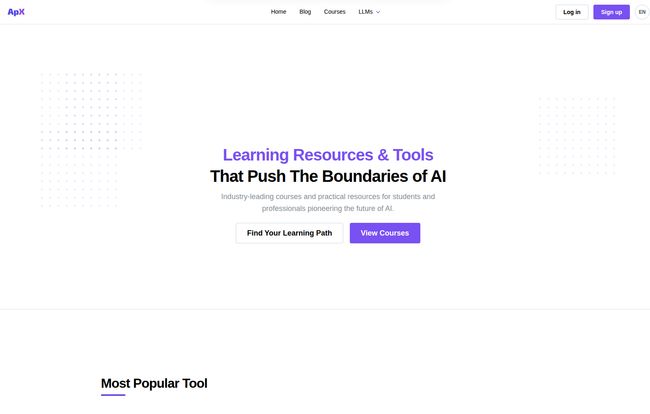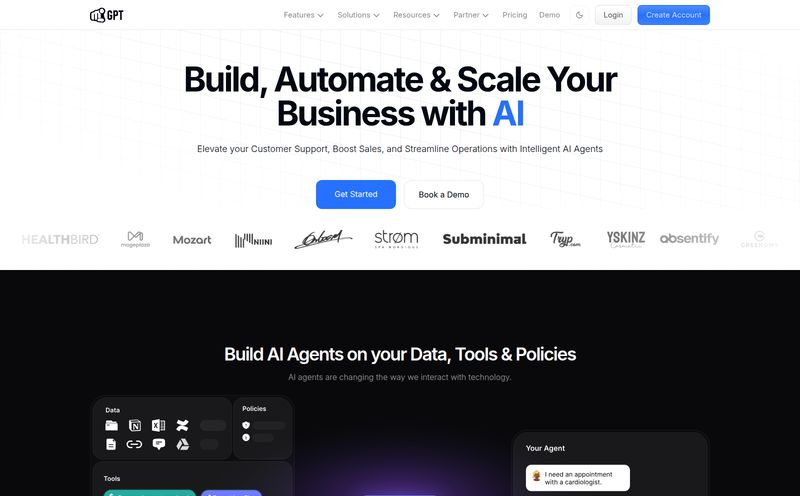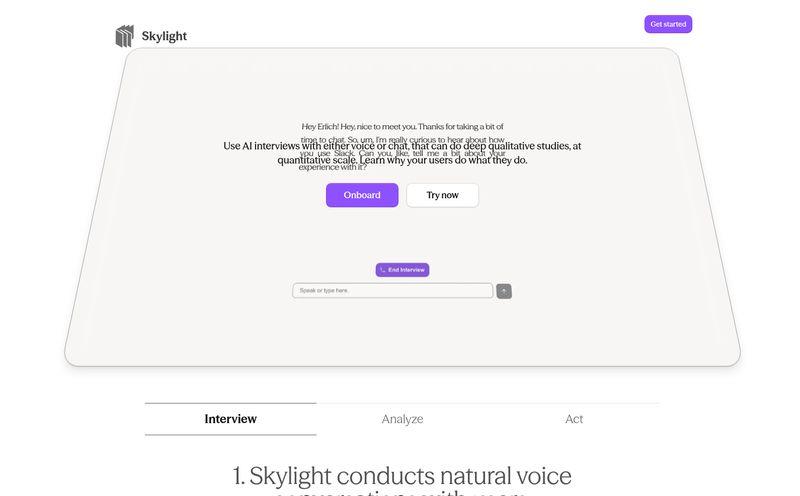The AI space right now feels like a gold rush happening in the middle of a dense, unmapped jungle. It’s exciting, sure. But it's also overwhelming. It feels like every week there’s a new groundbreaking model, a new must-have framework, and a dozen more think-pieces telling you you're already hopelessly behind the curve. For those of us in the trenches—developers, data scientists, and even seasoned SEOs like me trying to keep up—finding a clear path forward can be a real struggle.
You want to learn, but you also want to build. You want theory, but you need practical skills that actually help you deploy something real. This is the gap I see so many people falling into. And it’s why, when I stumbled across a platform called ApX Machine Learning, my curiosity was definitely piqued. It doesn't just promise to teach you; it promises to equip you. So, I did a little digging. Here's my no-fluff, honest-to-goodness take on whether ApX is the real deal.
What Exactly Is ApX Machine Learning Anyway?
First off, this isn't just another Coursera or Udemy clone with a fresh coat of paint. From what I can gather, ApX positions itself as a hybrid platform. Think of it as a workshop that not only teaches you the theory of woodworking but also gives you the pre-cut lumber, the power tools, and the blueprints to actually build a chair. It’s focused on the full lifecycle of a machine learning project, especially when it comes to the hot-ticket items right now: Large Language Models (LLMs).
The core idea seems to be about bridging that frustrating gap between learning concepts and deploying a functional application. They do this by combining structured courses with tools that automate some of the most tedious parts of the ML workflow—data preparation, model selection, you know the drill. It's built for people who want to work with modern tools like Python, LangChain, and LlamaIndex to create and manage real LLM applications.
The Learning Path: A Look at the Courses
The educational side of ApX seems to be its bread and butter. Scrolling through their offerings, it’s clear they’ve put thought into creating structured learning paths. This isn't just a random collection of videos. It's a curriculum. You've got foundational stuff like 'Python for Machine Learning' for those who need a solid base, and it scales all the way up to highly specific, advanced topics like 'Scaling and Deploying Large Language Models' and 'Building Production-Ready LLM Applications'.
What I appreciate is the blend. You can see courses on core concepts like Time-Series Analysis sitting right next to hands-on guides for Getting Started with LangChain. This tells me they understand their audience. We need both. We need the fundamental knowledge to understand why things work, and we need the practical framework knowledge to make them work. It’s a smart approach that respects the learner's time and ultimate goal: to become a competent practitioner, not just a theorist.
More Than Just Courses: The Tools That Matter
This is where ApX starts to get really interesting and sets itself apart, in my opinion. The platform isn't just a school; it’s also a toolbox. They seem to understand that one of the biggest hurdles isn’t just knowing what to do, but having the right setup to do it.

Visit ApX Machine Learning
The VRAM Calculator: A Godsend for DIY Builders
Okay, I have to geek out about this for a second. One of their highlighted tools is a VRAM Calculator for self-hosted LLMs. If you've ever tried to run a decent-sized model locally on your own machine, you know the pain. I remember spending a whole weekend trying to get a Llama model running on my rig, only to be met with cryptic CUDA memory errors. It’s incredibly frustrating. A tool that helps you calculate the specific hardware resources you need before you start? That's not just a nice-to-have, it's a genuine timesaver and a real godsend for the DIY AI community. It shows they get the practical struggles.
Automating the Grunt Work
The other big promise is the automation of key ML processes. Things like data preparation and model selection are notoriously time-consuming. It’s often the 80% of the work that isn’t glamorous at all. By providing tools to streamline this, ApX lets developers focus their brainpower on the more creative and challenging parts of model architecture and application logic. This is huge for productivity, especially for small teams or solo developers who don’t have a massive data engineering department to back them up.
The Good, The Bad, and The Code
No platform is perfect, right? Every tool has its strengths and its little quirks. Based on the information available and my own industry experience, here's how I see ApX stacking up.
What I Really Like
The intense focus on practical application and deployment is the biggest win for me. Learning to integrate with popular frameworks like LangChain isn't just an afterthought; it’s a core part of the curriculum. The structured learning paths are also a major plus, guiding you from A to B instead of just dumping a library of content on you. And, as mentioned, the inclusion of utility tools like the VRAM calculator shows a deep understanding of their user's day-to-day challenges. It feels like it was built by people who have actually done the work.
A Few Caveats to Consider
On the flip side, this platform isn't for a total beginner who's never written a line of code. The cons suggest that some prior programming knowledge is required for the more advanced courses, which is fair enough. You can’t really build an LLM application without knowing your way around Python. Another point is that the platform is still described as being "under development." This can be a double-edged sword. It means new features are likely rolling out, which is great! But it could also mean you might run into the occasional bug or a feature that feels a bit... unfinished. Just something to keep in mind.
Let's Talk Money: The ApX Pricing Mystery
So, the million-dollar question: what's this all going to cost? Well, here’s the thing. As of right now, I couldn't find a public pricing page. The link seems to be missing, which could mean a few things. They might be revamping their pricing structure, operating on an enterprise/quote basis, or perhaps they're in a beta phase where access is more controlled.
If I had to guess, I'd imagine a tiered subscription model makes sense. Maybe a free tier with access to some basic resources (like that awesome VRAM calculator and the blog) and then paid tiers for full course access and advanced tooling. But that's pure speculation. For now, you’ll have to head over to their site and maybe sign up or contact them to get the latest details. I'll be keeping an eye on this for sure.
Who is ApX Actually For?
After looking everything over, I have a pretty clear picture of the ideal ApX user.
This platform seems custom-built for the Python developer who's comfortable with code but wants to make a serious pivot into machine learning. It's for the data science student who has the theoretical knowledge from university but lacks the practical skills to actually deploy a model. It’s perfect for the AI hobbyist or enthusiast who is tired of just reading about LLMs and wants to get their hands dirty building real projects on their own hardware.
Conversely, it's probably not the best starting point for someone with zero technical background, or for an academic researcher who is only interested in pure theory. ApX is for the builders.
Conclusion: Is ApX Your Next AI Hub?
So, what's the final verdict? I'm cautiously optimistic. ApX Machine Learning appears to be a thoughtfully designed platform that correctly identifies a major pain point in the AI education market: the chasm between learning and doing. By combining a structured, practical curriculum with genuinely useful tools, it provides a much-needed bridge.
It’s not trying to be everything to everyone. It’s a specialized toolkit for a specific type of user, and I respect that focus. If you're a developer or a hands-on learner looking for a compass to navigate the wild, exciting jungle of modern AI, ApX might just be the map you've been searching for. It's definitely one to watch.
Frequently Asked Questions
What is ApX Machine Learning?
ApX Machine Learning is a comprehensive platform that combines online courses with practical tools to help users learn, build, and deploy machine learning models, with a special focus on Large Language Models (LLMs).
Do I need to know how to code to use ApX?
Yes, for the most part. While there may be introductory content, the platform's core value is in building and deploying applications, so a foundational knowledge of programming, particularly Python, is highly recommended to get the most out of the advanced courses.
What makes ApX different from other learning platforms?
ApX stands out by integrating learning with doing. It doesn't just offer courses; it provides automation tools for tasks like data preparation and practical utilities like a VRAM calculator, focusing on the entire workflow of an ML project.
Does ApX offer any free resources?
Yes, it appears so. The platform features a blog with articles and insights, as well as useful tools like the VRAM Calculator for self-hosted LLMs, which seem to be accessible to everyone.
What tools does ApX integrate with?
The courses and tools are designed to work with popular, industry-standard frameworks used in LLM development, including Python, LangChain, and LlamaIndex.
How much does ApX Machine Learning cost?
Currently, the pricing information for ApX is not publicly available on their website. It's best to visit the site directly or contact them for the most up-to-date details on potential subscriptions or course costs.
Reference and Sources
- ApX Machine Learning Official Website: https://apx.ai/



